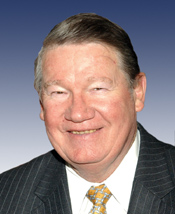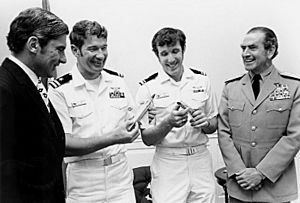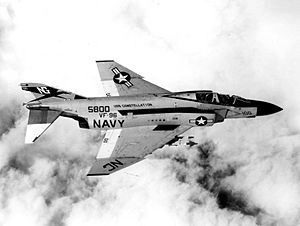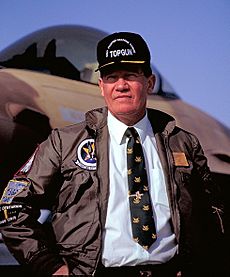Duke Cunningham facts for kids
Quick facts for kids
Duke Cunningham
|
|
|---|---|
 |
|
| Member of the U.S. House of Representatives from California |
|
| In office January 3, 1991 – November 28, 2005 |
|
| Preceded by | Jim Bates |
| Succeeded by | Brian Bilbray |
| Constituency | 44th district (1991–1993) 51st district (1993–2003) 50th district (2003–2005) |
| Personal details | |
| Born |
Randall Harold Cunningham
December 8, 1941 Los Angeles, California, U.S. |
| Political party | Republican |
| Spouses |
Susan Albrecht
(m. 1965; div. 1973)Nancy Jones
(m. 1974) |
| Children | 3 |
| Education | Truman State University University of Missouri (BA, MA) National University (MBA) |
| Military service | |
| Allegiance | |
| Branch/service | |
| Years of service | 1967–1987 |
| Rank | |
| Battles/wars | Vietnam War |
| Awards | Navy Cross Silver Star (2) Purple Heart Air Medal (15) |
Randall Harold "Duke" Cunningham (born December 8, 1941) is an American former politician, decorated Vietnam War veteran and fighter ace, and convicted criminal. Cunningham served as a Republican member of the U.S. House of Representatives from California's 50th district from 1991 to 2005, and later served prison time for accepting bribes from defense contractors.
Prior to his political career, Cunningham was an officer and pilot in the U.S. Navy for 20 years. Following the Vietnam War, during which he became the U.S. Navy's only pilot ace, Cunningham became an instructor at the U.S. Navy's Fighter Weapons School (better known as TOPGUN) and commanding officer of Fighter Squadron 126 (VF-126), a shore-based adversary squadron at NAS Miramar, California.
In 1990, Cunningham ran for the U.S. House of Representatives, defeating Democratic incumbent Jim Bates. He served in the House from 1991 to 2005. Cunningham resigned from the House on November 28, 2005, after pleading guilty to accepting at least $2.4 million in bribes and under-reporting his taxable income for 2004. He was sentenced to eight years and four months in prison and was ordered to pay $1.8 million in restitution. On June 4, 2013, Cunningham completed his prison sentence. He was granted a conditional pardon by President Donald Trump in 2021.
Contents
Early life
Cunningham was born in Los Angeles, California, to Randall and Lela Cunningham on December 8, 1941, one day after the attack on Pearl Harbor. His father was a truck driver for Union Oil at the time. Around 1945, the family moved to Fresno, where Cunningham's father purchased a gas station. In 1953 they moved to rural Shelbina, Missouri, where his parents purchased and managed the five-and-dime Cunningham Variety Store.
Education and military service

Cunningham graduated from Shelbina High School in 1959. He attended Kirksville Teacher's College for one year before transferring to the University of Missouri in Columbia. Cunningham graduated with a bachelor's degree in education and physical education in 1964; he obtained his M.A. in education the following year. He was hired as a physical education teacher and swimming coach at Hinsdale Central High School, where he stayed for one year. Two members of his swim team competed in the 1968 Olympics, where they earned a gold and a silver medal.
Cunningham joined the United States Navy in 1967. During his service, Cunningham and his Navigator/Radar Intercept Officer (RIO) "Irish" Driscoll became the only Navy aces in the Vietnam War, flying an F-4 Phantom II from aboard aircraft carrier USS Constellation (CV-64). He and Driscoll recorded five aerial victories against North Vietnamese MiG-21 and MiG-17 aircraft between January and May 1972, including three kills in one flight (earning them the Navy Cross).
In the final engagement, Cunningham downed a MiG-17, which was supposedly piloted by "Colonel Toon", a mythical North Vietnam Air Force fighter ace loosely based on a North Vietnamese pilot from the 921st Fighter Regiment named Nguyen Van Coc. It was later revealed by historians that there was no such Colonel Toon, and that the story was fabricated by Cunningham himself. Van Coc retired from the Vietnamese People’s Air Force in 2002.
While returning to the carrier after the final shoot-down, Cunningham and Driscoll were forced to eject from their F-4 over water near Nam Dinh, but they were rescued by Navy helicopter.
After returning to the US from Vietnam in 1972, Cunningham became an instructor at the US Navy's Fighter Weapons School (TOPGUN) at Naval Air Station Miramar in San Diego.
Cunningham served tours with VF-154, United States Seventh Fleet, and as executive officer/commanding officer of the shore-based adversary squadron VF-126. In 1985, Cunningham earned an MBA from National University. In 1987, he was featured on the PBS broadcast of the NOVA special "Top Gun And Beyond", during which he recounted his engagement with the North Vietnamese fighter pilot thought to be "Colonel Toon".
He retired from the Navy with the final rank of commander in 1987, settling in Del Mar, a suburb of San Diego. Cunningham became nationally known as a CNN commentator on naval aircraft in the run-up to the Persian Gulf War.
Political career
Cunningham's visibility as a CNN commentator led several Republican leaders to approach him about running in what was then the 44th District, one of four congressional districts that divided San Diego. The district had been held for eight years by Democrat Jim Bates, and was considered the most Democratic district in the San Diego area. ..... Cunningham won the Republican nomination in 1990 and hammered Bates about the scandal, promising to be "a congressman we can be proud of." He won by just one percentage point, giving Republicans full representation of the San Diego area for only the second time since the city was split into two districts after the 1960 census.
Cunningham's status as a Vietnam war hero made him a sought-after source, by colleagues and the media, in the debate on whether to use military force against Iraq in the lead up to the first Gulf War. Guy Vander Jagt of Michigan, longtime chairman of the National Republican Congressional Committee, said that Cunningham had considerable "drawing power" and was treated as a celebrity by his fellow Republicans.
After the 1990 census, redistricting renumbered the 44th District as the 51st and created the 50th District, splitting off a significant portion of San Diego County. At the same time, the 51st added several areas of heavily Republican North San Diego County. The new district included the home of Bill Lowery, a fellow Republican who had represented most of the other side of San Diego for the past 12 years. They faced one another in the Republican primary. Despite Lowery's seniority, his involvement in the House banking scandal hurt him. As polls showed Cunningham with a substantial lead, Lowery dropped out of the primary race, effectively handing Cunningham the nomination. Cunningham breezed to victory in November.
Even though the district (renumbered as the 50th after the 2000 census) was not nearly as conservative as the other two Republican-held districts in the San Diego area, Cunningham was re-elected six times with no less than 55 percent of the vote.
Cunningham was a member of the Appropriations and Intelligence committees, and chaired the House Intelligence Subcommittee on Human Intelligence Analysis and Counterintelligence during the 109th Congress. He was considered a leading Republican expert on national security issues. He was also a champion of education, using his position on the Appropriations Education Subcommittee to steer federal dollars to schools in San Diego. After surgery for prostate cancer in 1998, he became a champion of early testing for the disease.
Cunningham was known for making controversial comments. For example:
- Making a comment about gay Congressman Barney Frank, where he called the rectal examination for prostate cancer "just not natural, unless maybe you're Barney Frank".
- Displaying his middle finger to a constituent and "for emphasis, [shouting] the two-word meaning of his one-finger salute" during an argument over military spending.
- Suggesting that the Democratic House leadership should be "lined up and shot" — a call he had previously made about Vietnam War protesters.
- Referring to gay soldiers as "homos" on the floor of the House of Representatives when he said backers of an environmental amendment were "the same people that would ... put homos in the military." He later apologized for his comments.
While Cunningham said that "I cut my own rudder" on issues, he had a very conservative voting record. He was often compared by liberal interest groups to former congressman Bob Dornan; both were ardent conservatives, both were former military pilots, and both spoke out against perceived enemies. In 1992, Cunningham, along with Dornan and fellow San Diego Republican Duncan L. Hunter, challenged the patriotism of then-Democratic presidential candidate Bill Clinton before a near-empty House chamber, but still viewed by C-SPAN viewers. In September 1996 Cunningham criticized President Clinton for appointing judges who were "soft on crime".
..... After the sentencing, Cunningham was seen leaving the courthouse crying. .....
Legislative achievements
Cunningham was the lead sponsor of the Shark Finning Prohibition Act, which banned the practice of shark finning in all US waters, and pushed America to the lead on efforts to ban shark finning worldwide. For his efforts Cunningham was named as a "Conservation Hero" by the Audubon Society and the Ocean Wildlife Campaign. Cunningham also unsuccessfully advocated for the death penalty for all those convicted of shark finning.
The proposed amendment has passed the House many times, but narrowly missed the requisite 2/3 majority vote for passage in the Senate. Cunningham also advocated for the death penalty for all those convicted of flag desecration.
Cunningham was the driving force behind the Law Enforcement Officers Safety Act which was passed and signed into law by President George W. Bush in July 2004. The law grants the authority to non-federal law enforcement officers from any jurisdiction to carry a firearm anywhere within the jurisdiction of the United States.
Cunningham supported reinstitution of the Selective Service draft.
Personal life
Cunningham married Susan Albrecht in 1965; they had met in college. They adopted a son together. Susan Cunningham filed for divorce and a restraining order in January 1973, based on her claims of emotional abuse, and the divorce was granted eight months later. Cunningham later said that his life hit "rock-bottom" in that year.
In 1973, he met Dan McKinnon, a publisher and son of former Congressman Clinton D. McKinnon, who encouraged him to turn his life around. Cunningham married his second wife, Nancy Jones, in 1974. They had two daughters and separated in July 2005.
See also
- List of American federal politicians convicted of crimes
- List of federal political scandals in the United States



